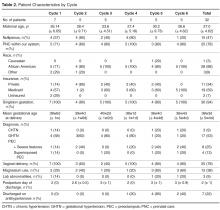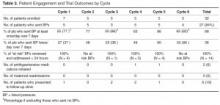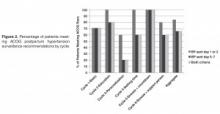For each of the 7 days following discharge from the hospital, patients received a standard text message in the morning and afternoon reminding them to text their blood pressure to the research telephone by a specific time. Reported blood pressures were reviewed and a standard response was sent by the study obstetrician based on an algorithm consistent with the institution’s postpartum hypertension protocol. Patients were sent reminders at all time points whether or not they had texted any BPs.
The ACOG Hypertension in Pregnancy guidelines recommend monitoring blood pressure at 72 hours postpartum (inpatient or outpatient) and again 7 to 10 days postpartum in women diagnosed with a hypertensive disorder of pregnancy [6]. We measured our ability to meet these guidelines by identifying how many patients texted blood pressures on post-discharge days 1 or 2 and post-discharge days 5, 6, or 7, as most patients were discharged home on postpartum day 2 or 3.
Sequential interventions were performed following principles of rapid-cycle validation using a Plan-Do-Study-Act cycle [16,17], each testing new ways to enhance our ability to acquire blood pressure data, but using small samples large enough only to test feasibility and initial responses ( Table 1 ).Strategies to enhance patient engagement were modified based on patient interviews and results from the immediately preceding cycle (for example, Cycle 1 interview information and results were used to make changes in Cycle 2), as well as studies on telemonitoring adherence in other populations [18]. The program ended after 6 cycles, as the study team felt there was sufficient promise to design an expanded platform suitable for a larger study.
Results
Overall
We enrolled 32 patients across 6 intervention cycles. Aggregate and individual cycle demographics are listed in Table 2 . Three patients (9%) had CHTN, 17 (53%) had GHTN, 8 (25%) had severe preeclampsia, and 4 (13%) had superimposed preeclampsia. The mean maternal age was 27 (± 4.6) years and average gestational age at time of delivery was 38w3d (± 5w4d). Mean day of discharge was postpartum day 2 (± 1d). All but 2 patients had singletons (94%).At the patient level, we received at least 1 blood pressure during the requested time frame from 27 of the 32 patients enrolled (84%). Nearly 65% of patients (20/32) texted at least 1 blood pressure reading on at least 5 out of the 7 days enrolled.
Of the 32 patients recruited, 27 (84%) texted at least one blood pressure on cycle day 1 or 2. Twenty-one of the 32 patients (66%) sent in at least 1 blood pressure on day 5, 6, or 7, meeting guideline recommendations for blood pressure measurements on days 7–10 postpartum. Two patients stopped texting blood pressures on cycle day 3 and three stopped responding on cycle day 4. However, all patients who texted blood pressures on days 5–7 were engaged since the start of the trial. Trend of engagement by cycle day is depicted in Figure 1 . Only 6 patients (19%) returned for their scheduled office blood pressure check (routine care). None of the patients enrolled were readmitted for hypertension or for any other cause within 30 days of discharge.




